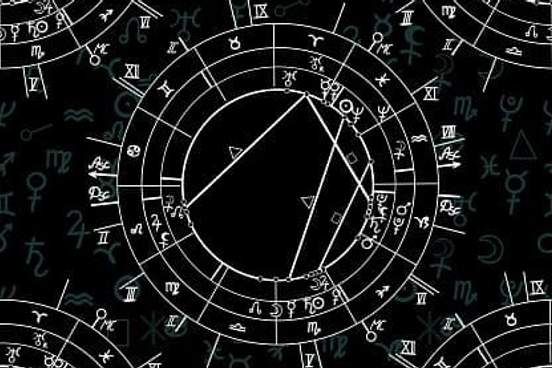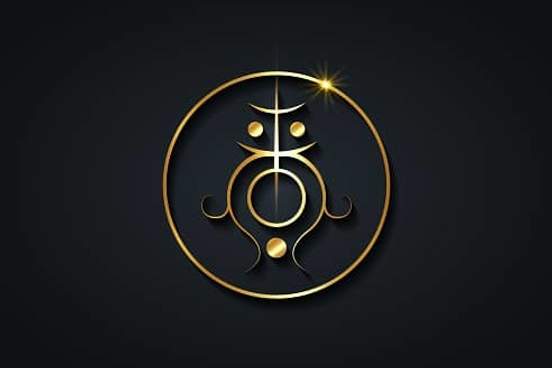
Constellation
Definition: the configuration of stars especially at one's birth that in astrology determines one's fate or status in life
Constellation enters English via Anglo-French but is rooted in the Latin com- ("with," "together") and stella ("star"). It can refer to any one of 88 arbitrary configurations of stars. It also designates an area of the celestial sphere covering one of these configurations and numbering 48 according to the 2nd century A.D. catalogue of Ptolemy, an Egyptian astronomer, mathematician, and geographer of Greek descent who flourished in Alexandria. The remaining 40 were documented after the ancients.
The constellations are named after a mythological personage, animal, or inanimate object.

Asterism
Definition: a group of stars that form a pattern in the night sky
An asterism can be a pattern of stars that makes up a constellation or of stars from more than one constellation. Its name is a borrowing of Greek asterismos, which derives from asterizein, meaning "to arrange in constellations." The root of these words is aster, the Greek name for a star.
High in the north-northeastern sky, you'll find the seven equally bright stars of the Big Dipper, so named because these stars appear to trace a ladle with a bent handle. The Dipper is an asterism (a group of stars that looks like something) that is part of the large constellation Ursa Major, the Great Bear.
— Dennis Mammana, Creators (creators.com), 15 Apr. 2021

Synastry
Definition: concurrence of starry position or influence upon two persons : similarity of condition or fortune prefigured by astrology
English adopted the Greek-derived Late Latin term synastria as synastry in the 17th century. The etymon's Greek parts are: syn- ("with," "along with," "together") + astr- ("star") + -ia ("state" or "condition"). Synastry is used as a word, like its Late Latin parent, for the positioning of stars that influences the fortunes of two people. 19th-century English novelist Charles Kingsley poetically describes this phenomenon in Westward Ho! as a "sympathy of the stars, which ruled the destinies of each person."
Their synastry charts—which astrologers use to compare compatibilities—reveal many more planetary challenges than alignments. Foremost among them is an exact opposition between Harry's rising sign—cautious and conscientious Capricorn—and Meghan's Mars, the planet that represents ambition, self-assertiveness, action and passion.
— Sally Brompton, The Daily Mail (UK), 11 Jan. 2020

Zodiac
Definition 1 : an imaginary band in the heavens centered on the ecliptic that encompasses the apparent paths of all the planets and is divided into 12 constellations or signs each taken for astrological purposes to extend 30 degrees of longitude 2 : a figure representing the signs of the zodiac and their symbols
The English word zodiac is a borrowing of Anglo-French zodias or zodiac, and the Latin adjective zōdiacus. The Latin is influenced by Greek zōidiakós ("zodiac"). In turn, the Greek combines zṓidion—a word for a painted or carved figure or a sign of the zodiac—with the suffix -akos, a variant of -ikos, which is equivalent to the English suffix -ic.
The signs of the zodiac represent the twelve constellations into which the zodiac is divided: Aries, Taurus, Gemini, Cancer, Leo, Virgo, Libra, Scorpio, Sagittarius, Capricornus, Aquarius, and Pisces.

Horoscope
Definition 1 : a diagram representing the twelve mundane houses and showing the relative positions of the Sun, the Moon, the planets, and the signs of the zodiac at a specific time (as at one's birth) for use by astrologers in inferring individual character and personality traits and in foretelling events of a person's life 2 : an astrological forecast
In Middle English, horoscope had the form horoscopum. The word was taken from Latin horoscopus, which itself is a borrowing of Greek hōroskopos. In Greek, hōra refers to a period of time as well as to the time of day, and skopos to a watcher or observer.
An individual's horoscope is made by analysis of the configuration of celestial bodies at a certain moment, as at the time of birth. (A horoscope at or of the time of one's birth is known as a "nativity.") Astrologers observe the positions of the bodies to determine character and personality traits. The practice is based on the belief that each celestial body has its own mythological character that is modified according to its relationship with other bodies at a given moment.

Decumbiture
Definition: a horoscope calculated at the time of taking to one's sickbed
The Latin verb dēcumbĕre, meaning "to lie down" or specifically "to lie ill," is the provenance of English decumbiture, which refers to confinement to a sickbed or to the time of taking to one's sickbed. Astrologers extended the meaning of the word by adopting it as the name for their prognosis of recovery or death of the sick after observing the position of the stars in the welkin.
One of his basic beliefs was that you could interpret the condition of the patient by what was called decumbiture, which is to see from the patient, exactly the moment when the symptoms began, and then cast a figure of the heavens to see the state of the stars at that particular moment. And from reading that chart, you could tell what the disease was, and you could also do a prognosis, is the patient going to recover or not?
— Benjamin Woolley, TVEyes, 10 Sept. 2019

Apotelesm
Definition: the casting of a horoscope
Apotelesm is an archaic word for the casting of a horoscope deduced from the consideration of the stars. Its spelling and definition is based on Late Latin apotelesma, meaning "effect" and specifically "an effect of the stars on human destiny." That word is cast from Greek apotelein, a combination of apo- ("away from, off") and telein ("to complete") that gives the word its sense "to bring to an end."

Exaltation
Definition: the part of the zodiac in which in astrology a planet is thought to exert its strongest influence
Terrestrial exaltation can come in the form of raising someone or something (as an athlete or their skill) in importance, or as a strong sense of happiness, power, or importance ("The team felt the exaltation in being the victor"). Extraterrestrial exaltation refers to the part of the zodiac in which a planet has its strongest influence.
Saying a planet is in its exaltation is an astrologer’s way of being fancy and saying that a planet is in the sign where its potential to function is at its highest. Venus is the ruler of Libra and Taurus, so it fits in beautifully with those two signs, but Venus can really make some magic happen in Pisces!
— Jake Register, Cosmopolitan, 13 Jan. 2020
Exaltation descends from Middle English in which it took the form exaltacioun, a derivative of Middle French and Latin words sharing the astrological sense. The Latin parent is exaltare and is based on the prefix ex- ("out of" or "from") and altus ("high"). The related verb exalt generally means "to raise in rank, power, or character." In astrology, it indicates a planet moving into exaltation.
When a planet is exalted, its expression is held in high esteem, allowing it to operate in the best way possible.
— Chelsea Jackson, The Elite Daily, 31 Mar. 2021

Descension
Definition: the part of the zodiac in which in astrology a planet's influence is thought to be least
The opposite of a planet's exaltation is its descension in which the level of its influence is at its lowest. Like exaltation, descension ascends from Middle French and Latin. In Middle French, descension is an astronomical word for the setting, or the descent below the horizon, of a celestial object. The Latinate root, dēscēnsiō, has the same "descent" meaning.
The exaltation is a house where the planet is given more power and freedom to act. The planet is a celebrated guest of honor. The sign opposite a planet’s exaltation was called its fall or descension. The house of its fall was considered a place where a planet is more downtrodden in its significations, like an unwelcome guest.
— Seven Stars Astrology, 6 Sept. 2012
The English noun descent and verb descend trace back to Latin dēscendre, a combination of de- and scendere, which is ultimately from scandēre ("to climb"). In astronomy, the verb indicates movement of a celestial object (such as a constellation or a planet) away from the zenith towards the western horizon. In astrology, it specifies movement of a planet toward its descension.
The brightest and highest is Vega, in the tiny constellation shaped like a parallelogram, called Lyra the harp. Below and left of Vega is Deneb, in Cygnus the swan, and then below and under Cygnus, we can see Altair, in Aquila the eagle. During the summer months this bright asterism will ride up and high near the zenith, and then descend in late summer and all through the fall toward the northwest horizon. Indeed, the Summer Triangle can still be seen low in the northwest sky in the weeks just before Christmas!
— Dennis Herrmann, The Tablot Spy (Easton, Maryland), 4 June 2013Tebbs said when an astrologer reads a person's chart, many more specific details figure in, including exact time and place of birth, and planets rising or descending at that moment and location.
— Dru Sefton, Newhouse News Service (Washington, D.C.), 2 May 2006

Dispositor
Definition: a planet which is in astrology lord of the sign where another planet is
In Latin, dispositor means "arranger" and ultimately derives from disponere ("to arrange" or "to set in order"). That verb joins the prefix dis- ("apart" or "in different directions") with ponere ("to put"). In astrology, the dispositor is a planet that "disposes" another planet—that is, it controls the power or influence of the other planet—because it is in its house. (Dispose in English once meant "to regulate"; it also means "to arrange," a sense still in use.)
According to Moody's Analytics, in all, the Great Recession led to a loss of more than $2 trillion in global economic growth, or a drop of nearly 4 percent, between the pre-recession peak in the second quarter of 2008 and the low hit in the first quarter of 2009. According to reports, the hemorrhaging of American jobs accelerated at a record pace at the end of 2008, bringing the year's total job losses to 2.6 million or the highest level in more than six decades post World War II. There were strong astrological reasons for this grim scenario. Between December 9, 2008 to December 19, 2009, Jupiter was in Capricorn sign…. Its dispositor, Saturn was in Leo, which is its inimical sign. All of this reduced the auspiciousness of Jupiter to do well, and lead to a banking and financial crisis. Judging from Kal Purush Kuundali (which is the common horoscope for the entire world), these inauspicious combinations occurred in the 4th house, which denotes real estate. No wonder, the real estate sector was the worst affected post the financial meltdown.
— Neeraj Dhankher, Business World, 19 Apr. 2020

Ascension
Definition: the rising of a celestial object above the ecliptic, equator, or horizon
Ascension comes from Middle French and Latin words. The Middle French is ascension and was used to announce the rising of Jesus into heaven; the Latin is ascēnsiō and means "ascent." English's noun ascent and verb ascend descend from adscendēre, which has the meaning "to ascend" and whose base word derives from scandēre, meaning "to climb."
In astronomy and astrology, the verb ascend indicates the rising of a celestial object (such as a constellation, a zodiac sign, or a planet) above the eastern horizon toward the zenith. This rising is called an ascension.
Cancer is named after the Latin word for crab, and it is represented by a crab in the zodiac. The constellation lies between Gemini, the twins, and Leo, the lion. When looking at the constellation with the naked eye it appears as an upside-down Y. Cancer can be seen in the early spring in the northern hemisphere, and in the autumn in the southern hemisphere. The right ascension of cancer is nine hours, and it has a declination of 20°.
— Daniel Nelson, Science Trends, 16 Jan. 2019
Additionally, there is the noun ascendant, which refers to an ascendant celestial object or to the point or degree at which the ascendant is above the eastern horizon.
Each type of sign describes where that planet or luminary (that’s astro speak for the Sun and Moon, btw) was when you made your earthly debut. And then there’s your Rising sign, also called your Ascendant. This one describes which zodiac sign was ascending the eastern horizon at the moment you were born.
— Leona Moon, Cosmopolitan, 16 June 2020

Sigil
Definition: a sign, word, or device of supposed occult power in astrology or magic
Sigil was stamped from Latin sigillum, a word for a small figure or image or a seal. Sigillum is a diminutive of signum (which can also mean "sign" or "mark"). The Latin meanings are reflected in senses of the English sigil, which, for one, is used for a seal. In astrology, it is used for a sign, word, or device (a talisman) having mysterious powers.
Readers of George R.R. Martin's Fire & Blood, a compilation of Westeros history that serves as the basis for the series, identified the seahorse as the sigil for House Velaryon.
— Mira Jacobs, CBR, 24 Apr. 2021Sigils are symbols used in ritualistic magic to harness all of your positive energy, hope, and will into action. According to the TikToker @witchy.tipss, a sigil is a manifestation method that uses magic to make your affirmations come true. Whenever you see this sigil, you're reminded of what you're manifesting which makes you think about it and helps will it into existence.
— Melissa Moscoso, YourTango, 23 Sept. 2020






